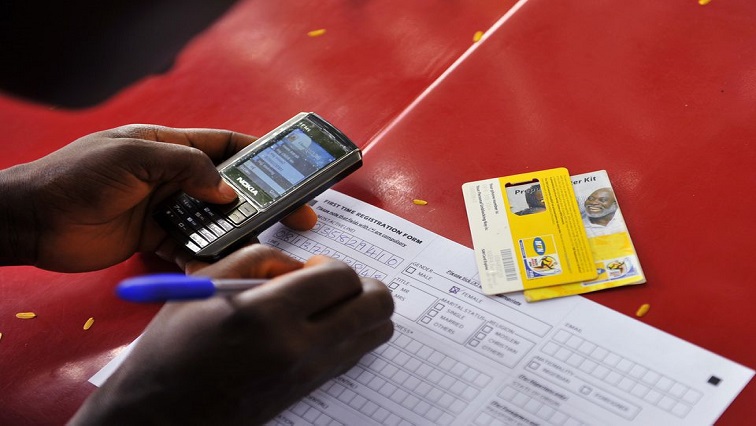Constance Chioma calls her son every morning to check that he is safe while studying in northeast Nigeria, a region plagued by deadly attacks by insurgents and armed kidnappings.
Earlier this month, she could not get through.
She later realised her SIM card was one of about 73 million – more than a third of the 198 million in Nigeria – which have been barred from making outgoing calls because they have not been registered in the national digital identity database.
“I could not concentrate at work; I was uneasy and constantly asking myself if he was safe,” said Chioma, a 57-year-old teacher in Owerri city in southeast Nigeria.
“With the rising insecurity in the north, not speaking with my son makes me afraid.”
Nigeria is among dozens of African countries including Ghana, Egypt and Kenya with SIM registration laws that authorities say are necessary for security purposes, but digital rights experts say increase surveillance and hurts privacy.
Nigeria has been rolling out 11-digit electronic national identity cards for almost a decade, which record an individual’s personal and biometric data, including fingerprints and photo.
The National Identity Number (NIN) is required to open a bank account, apply for a driver’s license, vote, get health insurance, and file tax returns.
In 2020, Nigeria’s telecommunications regulator said every active mobile phone number must be linked to the user’s NIN. It repeatedly extended the deadline until March 31 this year.
The government said outgoing calls were being barred from April 4 from any mobile phone numbers that had not complied.
Millions of Nigerians have not registered their SIM cards, for reasons ranging from concerns over privacy to problems reaching registration centres or not having a NIN.
“There have been no reasonable explanations as to why we have to link NIN to our SIM,” said Nneka Orji, a journalist in southeast Nigeria who has not registered her SIM.
“For that reason, I am not ready to do that,” she told the Thomson Reuters Foundation.
She now relies on WhatsApp to make calls, even though not all of her contacts use the messaging service.
The spokesperson for the government’s National Identity Management Commission (NIMC), which is overseeing the linkage with NIN, did not respond to requests for comment.
Officials have said the policy is needed to bolster security and identify criminals as the government battles insurgents and armed bandits who have kidnapped hundreds of people for ransom.
Nigeria’s 12-year war with insurgents has spawned one of the world’s worst humanitarian crises, killing some 350 000 people, according to United Nations estimates, including indirect deaths through damage to agriculture and healthcare.
LOSING CUSTOMERS
The push to get citizens to link their mobiles to the national ID database has sparked alarm among privacy activists, who warn that African governments are using new technology and laws to increase surveillance of citizens and dissidents.
Nigeria’s order to bar unregistered phones is “an infringement on the rights to freedom of expression and privacy” guaranteed by its constitution, said human rights lawyer Festus Ogun, managing partner at Festus Ogun Legal in Lagos.
“What law empowers them to shut out millions of citizens in this digital economy?” he said, referring to people relying on their phones for banking, mobile money payments, and accessing government services.
The barring of mobile phones has especially hurt women in rural areas with patchy mobile networks and poor road networks, who may lack the means to go to registration centres, according to human rights groups.
Charity Elem, a street food vendor in Awarra village in southwest Imo state, said she could not afford to travel to the registration centre in Owerri city about 60 kilometres (37 miles) away.
“Some of my regular customers come from Owerri. With my line barred, I cannot call them to find out if they want to place an order,” she said. “They will probably go to other vendors.”
There are nearly 800 registration centres in Nigeria – one in each local government office – according to official data. The NIMC did not respond to a question on their accessibility.
Others worry that their personal details will not be secure.
“I don’t think the NIMC and telcos have the right infrastructure to protect my data,” said Favour Akachukwu, a call centre agent in Ibadan in southwest Nigeria, who has not registered his phone.
Akachukwu said he has received numerous calls from fraudsters who had his 11-digit bank verification number – which is required to hold a bank account in Nigeria – and were trying to get further details from him to access his account.
WAR ON CRIME
In Kenya too, authorities have directed citizens to register their mobile SIM cards, citing security reasons. The East African nation has almost 65 million mobile subscriptions.
“Financial fraud, kidnapping, terrorism and related crimes prevail in situations of compromised SIM card registration processes,” Ezra Chiloba, director general of the Communications Authority of Kenya, said on Twitter last week.
“How can we win the war against such crimes if we cannot participate by ensuring that we have updated records?”
An April 15 deadline for registration prompted thousands of Kenyans to inundate local telecom outlets in Nairobi, fearing they would be locked out of their phones.
“There have been so many fraudsters, so I guess it’s a good thing,” said Dennis Blessing Wanja, a 31-year-old chef, as he queued outside a Safaricom outlet in Nairobi’s Lavington suburb.
Following complaints from the public and telecom companies about the short notice, authorities extended the deadline for registration until October 15.
Back in Nigeria, Chioma is not always able to speak to her son when she calls him via WhatsApp as her connection is poor.
“I never thought my line would be barred and that I cannot speak to him easily,” she said.
“I feel like my connection with him is not so strong.”






